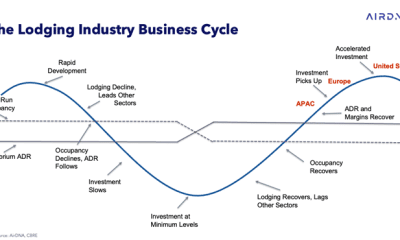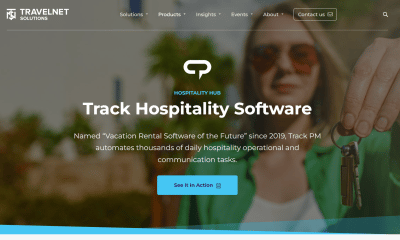
Vacation rental managers and homeowners in traditional vacation markets are up in arms about the many changes at HomeAway since Expedia’s purchase of the company in late 2015.
VRM Intel receives daily complaints from vacation rental managers and homeowners about HomeAway’s latest changes and actions, which are largely related to its decisions to: charge additional fees to guests, require online booking, mask customer data to eliminate direct communications between managers/owners and shoppers, remove all manager/owner information from listings to reduce “leakage,” and threaten to remove listings for perceived infractions of the new policies.
However, several HomeAway representatives believe the angst among vacation rental managers and owners is unfair, especially when compared to Airbnb.
After all, Airbnb also charges guests added fees, and it requires online booking. Airbnb also masks customer data and often removes listings for any perceived violations. In fact, all of HomeAway’s actions mirror those of their number one competitor, Airbnb.
And there is more to come. Airbnb employs pricing suggestion tools and automation (widely reported to push down pricing), and it standardizes contracts and cancelation policies, initiatives that Expedia-owned HomeAway is expected to launch over the coming weeks and months.
So why is HomeAway the recipient of so much passionate criticism while Airbnb skates by?
The answer is both simple and complex.
The simple answer is that, first, in traditional vacation markets (which include beach, lake, mountain, and Disney-oriented destinations), suppliers do not receive enough of their revenue from Airbnb to warrant such a response. Second, Airbnb didn’t change their policies. From the time that Airbnb began attracting suppliers in traditional vacation rental markets, their policies have remained consistent.
(We recognize that vacation rental managers and homeowners do not like to be referred to as “suppliers.” However, the OTAs consider managers and homeowners to be suppliers of the inventory that is available in their marketplaces, so forgive us for using the term going forward in the article.)
The more complex reason that HomeAway is being bombarded with upset suppliers is that its suppliers previously had a “relationship” with HomeAway. These owners and managers feel that they entered into—what they considered to be—a partnership with HomeAway (more specifically, HomeAway-owned VRBO.com). They paid a subscription fee to HomeAway and gave the company their inventory for the mutual benefit of increasing awareness and providing a two-way marketplace for vacation rentals. As a result, in what they thought was a trusting partnership with a company that valued their needs, suppliers obtained more bookings, HomeAway flourished, and vacation rentals as a lodging alternative became mainstream.
When Expedia purchased HomeAway, the game changed.
Suppliers felt duped.
History Lesson: VRBO.com was founded in 1996. VRBO.com was purchased by HomeAway in 2006. Expedia purchased HomeAway in 2015.
Expedia turned HomeAway’s listing sites into eCommerce platforms and fundamentally changed the way vacation rental managers and homeowners conduct business.
To take a deeper look, HomeAway’s supplier base can be divided into four distinct segments which have differing, yet equally infuriated, responses to the recent changes.
4 HomeAway Supplier Segments
1. Vacation Rental Homeowners
VRBO.com was a major vacation rental industry disruptor, as it provided homeowners—for the first time—the opportunity to promote and book their vacation rental homes to the mass market without the use of a property manager. In turn, the supply these homeowners gave the marketplace allowed VRBO.com to thrive. The partnership was a good one for both VRBO.com and homeowners. Consequently, homeowners placed all of their “eggs in one basket” with VRBO.com and utilized the site as their primary source of revenue. Through the VRBO.com marketplace, homeowners communicated with guests, screened out potentially disruptive parties, and set realistic expectations.
With the recent changes to policies, homeowners are no longer able to conduct personalized pre-stay communications and negotiations. In addition, the new “service” fees charged to guests have significantly increased the cost of bookings, have resulted in friction between the traveler and the owner and in many cases a substantial decline in bookings.
2. Vacation Rental Management Companies Founded Pre-2002
For vacation rental management companies founded before 2002, the disruption created by VRBO.com was significant. All of a sudden, homeowners had an outlet to market their own properties to consumers. These vacation rental managers found themselves competing, not only for inventory, but for guest awareness against HomeAway’s huge online marketing budget. This created a new segment of competition for professional property managers, a market-wide loss of inventory, and a push-down in market pricing.
In 2010, HomeAway purchased Instant Software, the largest software provider for these traditional vacation rental managers, which further entangled property managers with HomeAway and created a new layer of dependency on the company. After the software purchase by HomeAway, the company promised a “wall” between the software division and the distribution sites. In recent months, however, after Expedia’s purchase of HomeAway, that “wall” has come down, and property managers are just now beginning to experience the ramifications of Expedia’s use of their data.
3. Vacation Rental Management Companies Founded Post-2002
After 2002, a new group of vacation rental managers emerged. These managers began as homeowners, found marketing success booking through HomeAway/VRBO, and were able to build successful property management businesses by optimizing the marketplace and providing more personalized property care.
These companies literally grew up with HomeAway/VRBO and are especially reliant on their performance. For these companies, pulling their supply off of HomeAway is simply not an option, as it is their primary source of bookings.
4. The New Multi-Destination Vacation Rental Manager
As a result of the booking success of HomeAway, new multi-destination property management companies (i.e. Vacasa, Turnkey, etc.) have emerged with an above-average dependency on HomeAway as a primary booking channel. These companies have been able to flourish by leveraging HomeAway’s audience and have been more than willing to adapt to the company’s changes as they do not incur the additional marketing costs of using traditional or local marketing channels. However, these new companies are more susceptible to HomeAway’s changes than any other group. These companies are largely funded by outside investment, which gives them a short-term advantage in weathering changes. Yet with a decline in reservations generated by HomeAway, these new multi-destination companies face the immediate challenge of either finding new ways to get more bookings from HomeAway or attempting to replace these bookings through additonal channels.
Is the Supplier Push-back Against HomeAway Fair?
While it is true that Airbnb’s policies are no different, the resistance to HomeAway’s changes are felt much more closely to the wallet.
Airbnb dominates the shared-housing market and the short-term rental market in urban markets, but HomeAway accounts for the largest share of non-direct bookings in every traditional US vacation rental market. Any changes to the HomeAway model are felt immediately by their suppliers in these destinations.
In addition, many of HomeAway’s suppliers were able to build their property management companies and rental income based on their perceived “partnership” with the company. The reported decline in bookings generated by HomeAway decreases their ability to operate their businesses or—for homeowners—pay the mortgage on their vacation home.
But This Is How Hotels Work With OTAs. Or Is It?
When discussing OTAs and the vacation rental industry, experts often compare the hotel industry’s experience with OTAs. However, the comparison is far from apples-to-apples.
Here are some ways that hotels are better able to work with OTAs
- Hotel brands are prominently displayed on OTAs, while HomeAway has removed any mention of a vacation rental brand.
- Hotels have independent market data to keep OTAs from dictating pricing. HomeAway’s upcoming pricing tool and “Offer Strength” sort metric cannot be combatted without independent market data.
- Hotels have the ability to offer guests 24-48 hour cancellation windows. According to Jon Gray, ex-chief revenue officer for HomeAway, “The booking window for vacation rentals is typically ninety days.” In vacation rental markets where bookings are made an average of ninety days in advance, rebooking a vacant period caused by a cancellation made 24 to 48 hours before the guest’s check-in day is nearly impossible without offering potential guests heavy discounts and paying the high marketing cost of advertising that discount.
- Hotels do not have a need to communicate directly with guests. From the guest’s perspective, vacation rental shoppers often are looking for accommodations for up to 20 people in a party, have special needs, and need detailed questions answered. From the supplier’s perspective, accommodating for a large number of guests and setting the right expectations require direct communication with guests. It would be similar to hotels allowing instant online booking for meetings, weddings, and groups.
Will Suppliers Be Able to Sway HomeAway?
Expedia is accustomed to being disliked by its lodging suppliers and is not phased by the multitude of articles, blogs, forums, AHLA actions, and anti-OTA initiatives. The only strategy that will be efffective in swaying behavior at Expedia-owned HomeAway is for suppliers to remove inventory, and most of the supplier segments outlined above simply cannot afford to remove their supply from HomeAway’s sites. Expedia believes that, like hotels, vacation rental suppliers need them.
Yet a surprising fact is that, unlike hotels, in most traditional US vacation rental markets HomeAway only lists less than than 60 percent of the available inventory; and in many markets, HomeAway represents less that 40 percent of the vacation rental inventory. There is a slight possibility that vacation rental suppliers might come to the realization that OTAs need their inventory more than they need them.












We quit VRBO when they required us to book through them. We wanted to use them as a listing only. We advertise on other websites. Our traffic has not decreased.
What sites are you using?
As a traveler what sites do you advertise on? pamilyncooks@cs.com
I need to do that with Homeaway as they now want me to sign a policy that will allow them to DEBIT my bank account where they deposit my rental income!
As many others have indicated, we too will not be renewing our contract with HomeAway.
Since HomeAway bought up Toprural which we used for ten years without any problems, we haven’t had a single booking through them. Not only did we pay 230 euros for advertising through them but they add on a considerable percentage to each booking. To add insult to injury they advertise our prices incorrectly, causing friction between the client and ourselves. We still have ten months to run on our contract . I have already resigned myself to having thrown 230 euros away.They dont reply to emails. Why should they? they have banked the dosh! I shall never use Home Away again.
Is it VRBO or VRBE. We are all but taken out of the Picture. Now holding payements till book in and then a seven business day wait is going to far. In their ever increasing greed expedia is giving us no other coarse but to find other listing sites. For those of you who have Florida rentals, I have had some success at Florida Rentals .com. It is run like the old VRBO platform.Good luck to all and good bye to VRBO.
Matt, please tell me what the name of the FB group is so I can see what other people on FB are saying?
I’m new to FB and trying to use to help my listing get more bookings but some of these Groups on FB have so many different user rules to join or belong too it’s frustrating to say the least! I appreciate what all of you have shared about VRBO and whole heartedly agree they’re Killing Their Own Website!!!
The more people know of other websites to list on the better.
We should file a class action law suite but we first need a website of our own through our own association. I build websites if we could make a website owned collectively as a member based website with good policies and not screw the renters they would all flock to it once they know about it.
What do you all think?
LIZ Ault
We have been advertising/renting through HomeAway since 2007. We knew when the sold to Expedia, it would become a fee base website since that’s what Expedia is known for.
We use to assess the proper taxes to both State and local municipality. Without notification, they modified it so that they are in line with state regulation, but stock assessing the municipality. To offset this, we have to explain that to the tenants and assess a fee equal to that municipality tax.
They are now changing the payment process and will only pay us for the total rental at check-in. This means that they will keep this money in a saving account and accrue interest on our rentals.
Lastly, they use to have a maximum fee they would assess the tenants of $399.00. There is no longer a max to what I can see.
In a nutsheel, they went from a great company to a property management company, without service.
Needless to say, we are looking for an alternative.
I suspect there are 1000’s of us that have been using HomeAway are looking for an alternative. Post if you see something the rest of us can move to…
Agreed! It is a complete “screw” job for them to now take our money from the renter and keep it until the renter checks in, are you kidding me? I have long time renters that rent one year ahead of time, what give you the right to take my money, totally kill all of my cash flow and you make the profit. Wow, what way will you think of next to screw your customers? I’m sure you will come up with something, First, forced online booking, you will do it or not have an account here, now let’s take their money and keep it, It seems illegal and un-American, what a sad state of affairs. I have been with VRBO for over 12 years before they combined with Home Away and now it is continually getting worse. It is sad to say that I will definitely be leaving this booking site and looking for other ways to rent to vacation seekers. What a crock to pull and I can only hope and pray many, many, many users will cancel, cancel, cancel and they will go bankrupt. It’s all you can hope for. Very sad, very unprofessional and very disappointing I hope it comes back to bite them in the a**. That’s the most you can hope for. What goes around, comes around! Such a sad state of affairs. Satan personified. Definitely not a Christian based company!
Looking at alternatives. I am not a fan of abusive partnerships and VRBO has caused so many problems with my business beginning in about 2017. I have contacted them by phone 20 times this summer because the web site does not work properly, they screwed up my taxes with the State of Florida, they market properties without revealing hidden owner fees till the last second which puts my honest-up-front pricing at a disadvantage, their market-maker tool is 100% bull hockey, their financial reports are grossly inaccurate, and my property does not always show up when I search for it when it definitely should be there. I am a so-called “premier partner” – what a choke. In VRBO land “premier partner” is just another form of “bend over and take it”. “Dishonesty, Greed, and Abuse – Your VRBO”!
Just to add another screw-up, they started listing my property in Venice with properties in Sarasota and I got lost in the shuffle. I had rented 4 years in a row, a year before, but in 2017, I received only a few inquiries and had to reduce my price to rent at the last minute.
I started with VRBO in about 2010 and initially had good luck in renting our place. When the HomeAway purchase happened it seemed we had a slight decline in bookings for about 2 years. When Expedia purchased HomeAway we again saw a dip in business. In both cases, however, the business rebounded.
But best of all, the simplicity of doing this business has been greatly increased as a result of Expedia’s involvement. I’m definitely staying with the new system as I am super impressed with how much of the tedious work I used to do in terms of managing the process has been eliminated. I just need to focus on keeping the place clean, well-supplied and with all the necessary amenities. They do all the rest, including automatically refunding the deposit as long as I don’t make any noise within 7 days after departure. I think the service they provide is very well worth it. To think that paying $350/year to market your property was sustainable is naive. VRBO had a great concept, but they weren’t as good at business as Expedia.
Do you work for them Andrew? While I do agree that the process is quicker etc. but are you okay with someone booking your property, their credit card is dinged immediately by this great company and they keep the money until after the person checks in to your property? How can that be okay and how does that make them “better at business” than VRBO? are you kidding? you must not rent much, or have a cash flow problem, yikes! sad, sad, sad state of affairs and complete taking advantage of the owner of the property. What gives Expedia the right to keep money taken from the customer, immediately and not given to the property owner until check in? Wow! you are right, that does make them Way better than VRBO……NOT! Wake up
Simply put they have shifted their model to the point that a sate called Vacation Rental by Owner, does not allow you to talk to the Owner. If that is not ironic, I do not know what is. Basically they implemented a very fundamental shift in their business model. A unit I use to pay $500 to advertise they now take $4500/yr on, a 900% increase. I have removed all three of my units from their site and am advertising by other means. In addition, this has given rise to many other entrepreneurs now starting up new web sites to compete. I will be giving them my business.
What sites are you finding the most fruitful Donald? I am looking for other means as well. Very disappointed in the whole take over, screw job.
What sites are you using to advertise your rental?
What sites are you using? I am done with home away. After hours on the phone today one representative said “I agree the app is not easy to use and I am not a fan of the app” Isn’t that what we and renters are paying for?
Ditto for us-as with many of you who have commented. Our rental is a small business for uss. We also started with VRBO about 12 years ago when the owner paid an annual fee-of course it did go up every single year-I think the last we paid was around $350 for the year. It seemed fair as VRBO reached a huge audience, and we had control over all rentals and communication with folks looking to rent. It gave us the flexibility to e-mail or call back and forth with our “customers”…most importantly it allowed us to collect payments the way that worked best for us and our guests. Homeaway has turned into nothing but a greedy business…we dropped them (VRBO etc) 2 years ago. We use Craigs List and now will look into 2 other sites that have been mentioned on this comment board.
What I really don’t understand is that Homeaway management surely must read all the awful reviews they get-yet they don’t seem to care. I predict they will continue to lose their owner base steadily-we will never go back to them.
After using VRBO for YEARS , finally had to leave them last year when THEY told me they are collecting the rent money and then sending it to me ( after the tenant is already in the units???? )> Who are they to collect money on properties that we owe. They are charging a fee to be able to advertise on their site and that’s all they should be doing. Also since no direct communication allowed anymore with the people that are inquiring and have questions on OUR property – TIME TO GO! There are other sites – have not missed them a bit!
I had that exact reaction. I have not renewed, nor will I. Their new procedure of collecting MY rent money and charging ME 3% is insane
I need to find other sites to advertise on. Any recommendations would be welcome.
Since VRBO has prevented me from managing my property as I choose, I too have departed from. Really no direct communication with potential travelers, rental monies held by yapstone for up to seven business days before dispersing to the homeowner, booking fees….we’re all duped we pay these a—-s to advertise our property, that we maintain,and they collect a booking fee!!! If a class action lawsuit is in the works count me in.
We were Homeaway rental owners for 10 years. The changes they forced down our throats beginning a few years back really soured us on vacation rentals. After giving them our money for so long, we finally left them. You would think there would be a thank you for those years of business, but they really have shown the their lack of respect for homeowners. Adios HomeAway. Good riddance.
Homeaway, hiding behind their payment company, yapstone, is charging back payments that were refused by credit card holders.
If you are an owner or a manager you must verify your guest identity to insure payments to you.
Homeaway doesn’t bother to tell you that (’cause they really don’t care much about you). If a guest decide to get their money back, all they have to do is complain to the CC company and get their money back. And homeaway will chargeback from you.
All they have to do is have a scan of the guest’s ID on file, just like airbnb is doing.
Homeaway constantly arguing that they don’t check on the guests. Yet, they insist to collect the money from the guests and won’t allow the homeowners to do it themselves.
It’s time for a class action lawsuit.
I agree–it is past time for a class action lawsuit! HomeAway slowly and quietly bought up all the smaller vacation rental companies until they have a virtual monopoly. Now owners and travelers no longer have a platform where they can simply pay to advertise, but deal directly with the traveler on reservations, rental agreements, payments, etc. Does anyone know if there is somebody out there would be interested and experienced to help all us unhappy owners participate in a class action?
Help spread the word — there are alternatives. Homeescape and rbo247 are sites that operate like VRBO used to be. They both need more listings and awareness of travelers. I have listed my property with both of these sites. Together we can make them as popular and helpful as VRBO once was. Check them out!
I am a newcomer to VRBO/Expedia and although at first I was impressed, I am now sadly disappointed particularly with their Payment Processing Department. In speaking with the PPD directly the new rules regarding ADVANCE PAYMENT (which is getting your partial payment when customer pays) is now a random choice of the system as of 5/1/2018. Basically it means that they will hold your money until the traveler checks-in regardless of the check-in date (i.e. three months away). They will not even give you a window of how long this random approval for Advance Payment will take (weeks, months ???). I do want to thank VRM Intel and all of those who commented above as there is some very good info. being shared.
Expedia/VRBO/Homeaway….doing everything they can to steer people AWAY from our listing…at the top of the listing they have a link to other places. We’ve been with VRBO since it was begun by a couple! It’s so very sad now…we are getting zero leads suddenly in spite of doing everything Expedia asked. Where else to list?
Would LOVE to know the answer to your question “Where else to list “? as the rental business has become a monopoly …and I personally am selling my rental property for this reason . One thing also that seems to be swept a little under the rug is that UNLIKE AirBnB , the Expedia conglomerate, on top of taking a high commission on each rental , ALSO charges huge annual fees !
What no one has mentioned is that Homeaway is double dipping on the “supplier” side and the consumer side. Owners are still charged an annual fee, which they’ve just increased to $499, plus a 3% credit card fee AND they are charging the traveler a fee. Airbnb charges a traveler fee and only the 3% fee to the host/owner. I have all 5 star reviews and all the requirements they say you need to be at the top of their best match system but my bookings dropped considerably after the traveler fee was implemented and have not returned. Now that the fee has increased it’s no longer worth it to renew for the meager amount of bookings I get through them. As a traveler also, I know we used to use VRBO for our own personal vacations but now go directly to the rental agencies because of the FEE!! That’s what is happening in traditional vacation markets that don’t fit the Airbnb “sharing” model. Airbnb and Homeaway offered two different models and that was needed. Homeaway had the opportunity to differentiate instead of mimicking a model that wasn’t suited for a large number of its properties.
You’re absolutely right. Your experience echoes mine. There needs to be two different (!!) models.
And they’re holding payments for months, taking interest out of the pockets of owners and creating every reason in the world to find something else to do with houses besides vacation homes.
Those of us who started with VRBO AND VacationRentals.com weren’t with other companies because of their policies. It feels like a total betrayal to have been sold out. The basic conflict, besides the fact that now we don’t even get enough money to pay the lodging taxes and that is now coming out of our rental charges since the “commissions” forced on us, is that this is not the type of world I want. The company is forbidding us to do our own business, charging us and our guests extra fees, then taking a bow and calling it a commission. A commission is earned for doing good work. It is given for good work. This more accurately represents dishonesty, greed, lack of integrity and deception. I do not want to partner with this and look forward to the solutions we will find to do business differently.
Yes, you are absolutely right. They double dip. And worst still, they use Yapstone as a payment partner. This is Yapstone who take money from your account in a blink, but take 4 months to credit it. Long after the guest has been and gone and only after a real fight. After many many years, I am leaving HomeAway for this reason and the fact that we get less enquiries due to their new algorithms.
For serveral years with Home Away/VRBO, our vacation rental home was incredibly successful. We enjoyed direct communication with out guests along with the ability to position our home in featured listings and offer specials in the shoulder season. Now all of that is gone. As is our business. With the new policies, i haven’t had an enquiry for three months. Before, I would be 50% sold out for the off season months.
will cancel my subscription as well. If there is a class action suit, please advise. I’d like to join.
This is exactly what has happened to me after many years of successful renting. The direct communication with guests was extremely important for them as for us. In 2017 we got not a single booking and so far, April, not a single request for 2018. I am now wondering what the alternative to Home Away should be. Many thanks for any advice.
Elizabeth L. Widmann
you can also contact me on info@nextholidaylet.com and on 07880855121 get rid of these people
The article conspicuously neglect to mention the other huge losers of the Expedia ownership of Homeaway and VRBO…. The Consumers! Expedia green has raised the price for consumers to vacation in the exact same product as before, except there is now an xtra service fee.
HA has become harder and harder to work with over the last three years. The company I help manage is not dependant on their leads to be successful. That being said the ROI was worth the large investment year after year. I kept going through last year with the addition of the “booking free” but it was too far when they took our ability to talk to the guest. I know my inventory of 400 rentals is not a big deal to them overall but in my market, they just lost half their inventory. If they would change their policy, I would come back but I am tired of being treated like Checkolavacia before WWII.
Interesting. As a person who is in the very beginning stages of considering shopping for and investing in a vacation rental property in the Orlando/WDW area, what advice do y’all have? Is this a sign that what once may have been a great idea no longer is? Is it too late to make a “go” of this? Or would I as a newcomer without any previous dependencies be in a better position to accept and run with whatever the “new normal” has become?
Hi Keith!
It is a great time to be in this business. I would take advantage of all these opportunities while being cognizant of my brand. If you have made the effort to build a website and or brand presence, then you need to focus on the long haul and have a solid retention strategy day one. If your building your business on the OTA’s without protecting your brand you will be in for a rude awakening.
Con artists are rampant in Florida they will see sucker on your forehead
Home away is rampant with crooked double dipping property managers and taking cash I hope the feds investigate all the cash Florida is rampant with charlatans and they will see sucker written on your forehead and take your money I will never do business with either HA or Expediafucking thiefs
I recommend Airbnb. No up front fee and they are there for both owners and guests
We are done with Expedia, in addition to NOT renewing my listing, my family will never support any Expedia owned company or platform ever again, it is extremely easy to book direct with hotels, bed and breakfasts and airlines. Cut them out of your life. We are just little people to be sure, but in numbers, we may get heard.This corporate mentality is disgusting, look around, it affects florists, FTD, Uber (good luck with your new CEO)and numerous other companies in our lives. But the populace at large are mostly sheep, good obedient sheep that will blindly accept what comes down the pipes. As Nancy Reagan said, just say no……….
I agree!!
Amen. You have hit the nail on the head. I will not allow my family to use Expedia. Local travel agent only. Expedia has taken too much of my hard earned money. How many beds have they made and bathrooms have they cleaned to deserve a cut of my rent on top of their subscription fees?
.
Bad corrupt companies all of them.
I am a property manager of over 404 vacation rental properties in NC. About a month ago I cancelled my contract with homeaway and removed all of my listings. Homeaway was with the money (120k) but not under these new policies. I plan to spend that 120k in other ways that will make up the 7% of bookings that VRBO produced. I know I’ll more than makeup the 7%. They are killing the golden goose…their suppliers! I’m just happy to not need them to succeed. Thank you Jesus. They really stink now.
VR destinations need to form marketing associations and take control of their markets. It’s easy to band together and have huge marketing budget. If you aggregate all local inventory on one site, you will train people where to book.
No one is staying in my rental home without my pre approval. I’m done with home away. I have been with homaway for 10 years and only had one bad rental. That’s because we had a personal relationship with our guest. There are alternatives coming up all over.
Hi Pat D, you are not alone in your thoughts there! Are you on Facebook? Social Media is becoming a viable option to getting direct bookings. I have a Facebook Group called the Holiday Rental Owners Network where independent holiday rental owners support each other to ultimately get bookings direct with the guests -https://www.facebook.com/groups/holidayrentalownersnetwork
I agree. I plan to join the class action suit.
Agreed! It’s MY property and I get to decide who stays there . . . AFTER I’ve communicated with them myself.
We all simply want a new “old” VRBO site with policy guarantees. If this opportunity arises, Expedia/Homeaway will lose their market share overnight!
I have listed with fairly new sites that are like VRBO used to be. Homeescape and rbo247. If EVERYONE would start using these sites, maybe they will become as popular as VRBO. Say no to corporate greed!
Marketing is expensive. Free rides are over.
Most newbies using one channel to market have a problem…..time to pony up some of those gushy profits to fund the metasearch engine competition war…..
Homeaway will be a winner……expensive but a winner, for awhile-
Aron, you are drinking the Koolaid or are you an Expedia mole? Many of us are not newbies, breach of contracts if we, the little guy did these things that Expedia has subjected us to, would be hung up by our toenails. Yet Expedia seems to have complete immunity. You have missed the point here. They are forcing the “suppliers to bend to their will”. And many dependent sheep will do so , but will there be enough to line their pockets?. They have underestimated the traveller as well.
Once they start dictating prices and controlling that part of the market, I can’t even imagine how many laws that will break. You don’t own anything do you Aron , those gushy profits aren’t what you think. Nor is the motivation for a large number of people owning second homes. Corporate thinking is getting more and more tiresome, just in line with the empty soul-less people that guide them. Look at the POTUS.
Nobody is looking for free advertising Aron. We pay VRBO an annual fee. I’m not a newbie nor do I make mushy profits. As a matter of fact, with VRBO’s new practice of showing a 30 mile radius of properties when a customer searches on a specific town, my bookings have all but dried up. My being contacted by scammers, however, is on the rise. Way to go vrbo
Its all been said before. I have just cancelled my properties with Home Away.
What booking help did u move to?
Homeaway took advertising funds from VR owners and managers under an agreement explicitly based on direct contact with guest inquiries.
Now they want to,keep the advertising money and also collect fees from guest as well as a lousy exchange rate if you are in a foreign country.
Basically they are acting in bad faith and pulling a con.
They do not own or manage properties or take care of guests needs. To cut off communications is simply their ploy to guarantee they collect their non refundable fees.
They could care less about hosts or guests.
I agree wholeheartedly. As a VR owner of a single family house (VRBO’s bread and butter), I will be taking OFF my listing with them. I don’t need them anymore and if the sentiment in a large FB group is any indication, I am one of thousands that feel totally betrayed. WE ARE what made VRBO such a success.
Airbnb did not change their rules. Expedia, promised owners they would NOT charge a guest service fee, then 6 months later began charging guest service fees and have continued to increase the percentage charged to the guest. If supplier (Vacation Home owners) wanted to have the Airbnb rules, they would have been with Airbnb not homeaway.
You nailed it Jayne Walters.